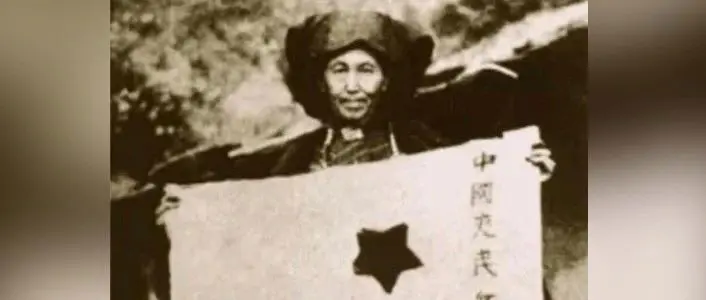She sewed a flag into her pleated skirt, until the year after...

In Mianning County, Liangshan Yi Autonomous Prefecture, Sichuan Province, there is a high-altitude freshwater lake known as Yi Lake. In recent years, Liu Bocheng, the commander of the Central Red Army's vanguard unit, and the Yi compatriots performed a blood pact here. With the help of the Yi compatriots, the Red Army's vanguard unit successfully passed through the Yi region, considered a "forbidden land," in just one day.
"Twenty-Five Thousand Miles of Voyage" Episode 6↓
"All Yi and Han commoners are brothers and flesh and blood." On a certain date, the Central Red Army arrived in the Lugu area, and in order to cross the Dadu River, the troops were divided into two routes heading north. The right route took the main road to feign an attack on the Dashuba Ferry, while the left route, the main force, passed through the Yi settlement area via Mianning and headed north. At that time, passing through the Yi area was very difficult due to sharp ethnic conflicts, language barriers, and communication difficulties. How could they pass through the Yi area peacefully? "All Yi and Han commoners are brothers and flesh and blood," the answer was given in the "Proclamation of the Chinese Workers' and Peasants' Red Army" signed by Commander-in-Chief Zhu De.
When the vanguard of the Red Army entered the county town of Mianning, the soldiers slept in the streets to avoid disturbing the residents. The Red Army also conducted propaganda activities in Mianning, publicly burning documents such as the hostage exchange notes and land deeds that the Yi compatriots were forced to sign, and demanded that the troops strictly enforce the Party's ethnic policies, with no one allowed to fire without orders. On the specified date, Liu Bocheng met with the head of the Guoji family branch of the Yi ethnic group, Xiao Yedan, at the Yi Sea. Xiao Yedan, as he would have done with Nationalist officials in the past, was about to kneel, but Liu Bocheng quickly pulled him up. Liu Bocheng reiterated the purpose of the Red Army with sincerity, promoted ethnic equality, and expressed that the Red Army and the Yi compatriots should be good friends. Liu Bocheng and Xiao Yedan, according to Yi customs, swore an oath of brotherhood by drinking blood, and Liu helped them establish their own red armed forces. The enemy never dreamed that, in just one day, the vanguard of the Red Army, with the help of the Yi compatriots, would successfully pass through the Yi region, considered a "forbidden land."
To protect the Red Army flag of the Yi people, she sewed it into the lining of her pleated skirt. Subsequently, the main Red Army forces successfully passed through the Yi settlements, gaining precious time for the strong crossing of the Dadu River and the daring capture of the Luding Bridge. However, the Kuomintang pursued the charges against Xiao Yedan, forcing the Guoji family to hand over the Red Army flag, ten thousand taels of silver, and the head sheep. Xiao Yedan, rather than handing over the Red Army flag, would rather lose everything and instructed his wife, Luowu Wujiamo, to protect the flag. In the year, Xiao Yedan died in an ambush. In the following years, Luowu Wujiamo kept the Red Army flag sewn into the lining of her pleated skirt until the Liberation Army liberated Mianning in 1950, when she finally took out the Red Army flag of the Yi people and presented it to the Liberation Army stationed in Mianning.
The story of the Yi-Hai Alliance has been passed down through generations, and the red land has taken on a new look. This tale of ethnic unity, the Yi-Hai Alliance, continues to be told today, and the spirit remains undiminished on that red land, which has now transformed. Located kilometers north of Mianning County, the Daqiao Reservoir is formed by the convergence of numerous rivers and lakes, including the Yi-Hai. It took nearly a hundred million yuan and years to build, solving the water problem for millions of people and nurturing a green and lush landscape. Thanks to the irrigation and nourishment from the Daqiao Reservoir, the selenium-rich japonica rice grown in Hebian Town, Mianning County, has become a coveted delicacy for the people of Liangshan.
In the center of Mianning County, the Red Army Culture Square sees Han, Yi, Tibetan and other ethnic groups dancing and singing in front of the red sculptures. History has staged miracles here, and reality has reaped happiness.

